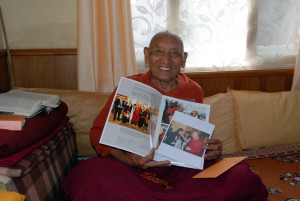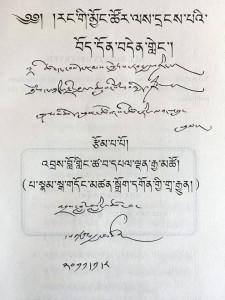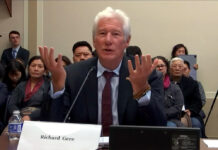
By Puntsok Tsering Duechung*
(TibetanReview.net, Dec06, 2018) – I was repeatedly given to hear from my mother during my days as a child living in Tibet concerning my uncle Palden Gyatso-la of Panam Gadong Bhelre that during the period he and my grandfather Duechung Sonam Dorje-la remained in jail and later in labour camp, she frequently paid visits to deliver food for them.
Although released for the first time in 1975, Palden Gyatso-la was sent back to jail in Lhasa for having engaged in numerous kinds of protest activities, including by putting up posters, in the 1980s in his continued campaign for the fundamental cause of Tibet. By that time my mother too had moved to Lhasa and visited him on occasions to deliver food.
It was in 1993, I think, that we heard from radio broadcast services from the United States of America that Palden Gyatso-la had managed to reach India after his escape from Tibet and, in particular, that he was telling people across the world all the details about what he had endured during his years of imprisonment in Chinese ruled Tibet. My mother and another uncle were delighted to hear it all. And they said, with much admiration, “What an accomplishment by uncle Palden Gyatso-la! How daring of him indeed!”

After I arrived in Germany, I had a repeated urge to visit my uncle Bhelre Palden Gyatso-la. However, I could not make contact with him until 2003. In that year, while he was visiting the United States, I succeeded in calling him up by telephone and had the good fortune to be able to speak with him. I do not clearly remember now each and every word of what he told me at that time.
After that, on the 22nd of December in 2010, I sent to him from New Delhi a letter and a small present through an acquaintance. Later, in the beginning of January 2011, when I visited Dharamsala for the first time, I went to see him. That was the first time in my life that I saw my uncle Palden Gyatso-la. At that time he was staying in a room in a two-storied building near Kirti Monastery. I knocked on the iron rail outer door while shouting “Kushab Palden Gyatso-la!” to call him. After a short moment, he came out of a room while asking, “Hello, Who are you?” After I gave a brief introduction of myself, he opened the door and I accompanied him up the stairs to his room. I can still remember it as a spotlessly clean, cozy-looking place with great clarity.
He began by asking, “are you the youngest son of Ani (paternal aunt) Dadon-la of Duechung Phunkhang?” I replied by explaining that I was the son of my grandmother Dadon-la’s daughter. With that, we had a discussion on many things. However, he had no memory at all of the telephone call I had made to him and the discussion we had in 2003. But he did tell me about a visit he had previously undertaken to Germany to speak about the situation in Tibet and about his life. And he told me about each and every person who had been looking after him. He spoke to me about the events concerning the scripting of his autobiography by Gen Tsering Shakya-la, its eventual its publication, the latest developments on it, how he was using the income he was earning from it, and so on. Along with it, he told me that the Library of Tibetan Works and Archives at Dharamsala had just published a Tibetan language version of his autobiography. With that he presented to me a copy from among the first lot of it.
Apart from that, when I spoke about our extended family and about those who had since passed away, he kept muttering “what a pity! What a pity!” I also asked him about my grandfather Duechung-pa Sonam Dorje during his years in prison with him. My grandfather had been forced to spend 18 years in prison, extending from 1959 to 1977. After release, he was told that if he agreed to become a member of the local level Chinese People’s Political Consultative Conference, he would be given a job and salary. However, he was resolute in turning down the offer.
“Dedrung-la (a reference to the man by his previous title as secretary of a local entity –Editor) was not only a courageous person but also a man with flair for writing.” So saying he took up his rosary and said: “What a pity! What a pity! He and I were among the very first to be imprisoned at Norbu Khyungtse in 1959. Because he was an office bearer of the Duechung District, they took him to Gyantse. At the time of being taken away, he took off a necklace of dzi and coral and told me while handing it to me, ‘Ola Kushab, please ensure that you reach this to Dadon-la.’ When one day Ani Dadon-la came to see me at Norkhyung, I threw away the necklace on the road outside and told her, ‘well, there it goes’. Ani-la was intelligent enough to understand what I was indicating and quickly went out to collect it and to go away.”
And so we talked the about times then and now and we had a very satisfying end of the day. During the period of several days I stayed at Dharamsala at that time, Palden Gyatso-la insisted that I should join him for a dinner outside. And so he took me to a restaurant where they served my favourite dish of momo.

I scheduled a visit to Kushab Palden Gyatso-la early in the morning of the day on which I was to go back to Europe. At that time, Tibetans in Dharamsala were busy making preparations for the upcoming Losar. And so I bought a bag of flour, a bag of rice, a dozen tea bricks, butter, salt and so on and visited him with a view to offer them to him as my Losar present. On that day Kushab had made preparations for a“gSol Tshok“ forme in his little guest-cum-living room. He had kept in readiness a thermos flask filled with sweet tea and two cups. On the table he had placed a wooden frame in which a high quality ceremonial scarf was rolled up as well as a Tibetan currency in denomination of one hundred rolled in a traditional Tibetan rice paper. Also kept in readiness in the wooden frame was a Tibetan tamka coin.
And he told me with a great show of fondness: “You are now leaving for a far off place. I readied these presents for you as a token of my affection. I wish for you a great future.This gSol Tshok symbolised that you shall earn good merits. And I want you to work for the greater good of Tibet and thereby become a person in full readiness to carry out the wishes of His Holiness the Dalai Lama. I wish for this moment to be an auspicious harbinger for these. Next year I will travel to the United States for medical treatment. And I will send you a high quality turquoise piece. Keep that as the turquoise of the essence of your life, son.”
He poured out tea into a cup and handed it to me as he said these. He then placed the high quality ceremonial scarf to hang it from the back of my neck and touched his forehead against mine. As it was the first time I received such a beautiful way of presentation, the imprint of it still lingers in my mind as if it had occurred only yesterday.
From then onwards, I was able to maintain uninterrupted contact with him, making frequent telephone calls to him, sending him letters, and so on. Although he did not keep a telephone set himself, I was able to remain in touch with him with frequent calls I made through monk Lobsang Choephag of the Institute of Buddhist Dialectics. On occasions, I also sent message to him through journalist Pema Thinley-la.
It was in about the year 2014. Through Zoge-la –who helped in my correspondences with Kushab Palden Gyatso-la until he moved to the West –I received a message saying my uncle had sent for me a video recorded message through the executive director Kai Müller of international campaign for Tibet (ICT), Germany. Later during frequent telephone talks, Palden Gyatso-la repeatedly asked me whether I had received that video recorded message. And because I had not received it, I repeatedly wrote to Kai Müller and colleagues to ask about it. However, his only response was that because he was busy with many works, he had no memory of where he had placed the compact disc containing the video recorded message. The fact of the matter is that I never received the short video message containing an ardent request made to me by kushab Palden Gyatso-la.
From 2011 to 2018 I visited Dharamsala two times for official works. But on both the occasions, kushab Palden Gyatso-la turned out to have gone to the United States for medical treatment.
On one occasion, while travelling in a subway train, I received a telephone call from a Spanish number. When I took the call, the voice from the other end said, “This is Thupten Wangchen speaking. You relative Kushab Palden Gyatso-la wishes to talk to you.”
This was in February 2014, I think. It was on the occasion on which Kushab Thupten Wangchen-la had invited Kushab Palden Gyatso-la to Spain to testify in the genocide case against top Chinese leaders before that nation’s High Court.
On that occasion I travelled to Spain and shared a room for two nights with Kushab Palden Gyatso-la. At the time of going to bed, Kushab Palden Gyatso told me, “Son, after I go to sleep, I might make strange loud noises. There is no need for you to be afraid. This is probably a result of the great amounts of suffering inflicted on me during my years in prison.”
He also told me, “I have now shifted to Kirti Monastery. I owe very great debts of gratitude to Kirti Rinpoche. In order to fulfill my request to him, Kirti Rinpoche called a general meeting of the monastery’s monks and asked them to discuss whether it was all right to take me into the monastery. All the monks were spontaneous in saying it was definitely all right to take me in and the matter was decided accordingly.
“After that, I also offered my home to Kirti Monastery. Kirti Monastery will look after me until my death. I was asked to choose a cozy living quarter in the monastery, which I did. I am very happy now, son.” And so on.
Meeting with uncle Palden Gyatso-la of Bhelre at the home of Director Kushab Thupten Wangchen of the Tibet House in Spain was my very last. I never imagined at that time, however, that this was to become my last meeting with him, nor at any time afterwards.
In September this year, when I again visited Dharamsala, I tried to make contact with the hope to meet with my uncle again. But he had already left for the United States. After Kushab Lobsang Choephag-la left Dharamsala, my telephone contacts with Kushab Palden Gyatso-la became much less. However, my mental bond with him remained extremely strong as before.
Recently, on the 16th of November, news reports began to emerge, saying the health condition of Kushab Palden Gyatso-la was very critical. I immediately called up Tibetan Parliament in Exile member Kushab Dhondup Tashi-la to ask him whether he was able to deliver to him the packet of present I had left with him for this purpose in September. It turned out that he had not only visited Kushab Palden Gyatso-la that day itself but also tried to make contact between us with his mobile phone handset so that we would be able to talk to each other. But it was not to be. He had called me up several times, but he kept getting a busy signal from my end, as I happened to be talking with someone else at that time. About an hour later, when I realized it, I at once called up Kushab Dhondup Tashi-la. But by then he had already returned to his residence. However, he had taken notes of his conversation with Kushab Palden Gyatso-la and he sent a copy of it to me.
And this was what his notes said: “Dear Friend Phuntsok-la, I visited Kushab Palden Gyatso-la in the afternoon today. I have already delivered to him the packet you left with me. His room, bed and so on are in great conditions, very clean. It appears that he is not able to move about that much. Monks of Kirti Monastery are taking turns to look after him. At the time of my visit, he was in conversation with two around 60-year-old men, a girl, and an elderly monk. Gen Palden Gyatso-la was sitting up on his bed, resting his back on a pillow. He has turned very thin. But I noticed that his mind and consciousness were very sharp. It appears that this morning he had an interview with two journalists.
“The gist of what Gen Palden Gyatso-la told me, and asked me to tell you, was this: ‘Phuntsok Tsering is my relative. He is a good person, and a man of ability. He is also a person with high level of learnedness. His wife is a foreigner. They have two children. Please tell him not to worry about me at all.Please tell him to work well for the general good of the Tibetan cause, to exert his willpower for this end, and to give good education to his children. Tell him I do not have any other problem. Kirti Gonpa is being extremely good to me. I am now 89 years old. My ailment is liver cancer. There is no way this could be cured by going to hospital. I have neither fear nor concern about dying. And so on.
“According to what one Kirti monk attending to him told me, Kushab Palden Gyatso-la was probably ill even before going to the United States. After going there, the illness worsened. He returned to India around the 28th of October 2018. And around the 10th of November, he had sought an audience with His Holiness the Dalai Lama. He said Gen-la was only taking a little bit of tsampa and did not eat much. He also takes Tibetan medicine and he does not appear to have any major problem such as being in pain.” Thus wrote Dhondup Tashi-la to me.
After that I wrote to Gen Pema Thinley-la. He in turn gave me two telephone contact numbers at Kirti Monastery. I rang these numbers a number of times, but there was no response. This morning, Gen Pema Thinley-la wrote to me to say Kushab Palden Gyatso-la had passed away.
I then made three butter lamp offerings, remembering with glittering clarity the relationship Kushab Palden Gyatso-la and I had shared, and his showering of affection and giving of advices to me thus far. It is only with regret that I keep in mind the fact that having sacrificed so much and earned such great admirations for it, he did not live to see his homeland again. It made me let out a deep sigh of sadness.
Written at office on this the 30th of November 2018
Germany
—
* Puntsok Tsering Duechung was born in Tibet, came up to Germany in 1998, and currently works as managing director of Tibet House Germany, Frankfurt






Very interesting, touching and inspiring article. Thank you for sharing it with us. Rest in Peace, Kushab. Palden Gyatso la. OM MANI PADME HUN!
Thank you for this obituary. My father was a political prisoners living in 90s in Dharamsala, languished in absolute poverty in a barely habitable tin-roofed hovel in an ghetto called ‘ Amdo Village.’
He requested CTA to be sent to USA along the 1000 Tibetans sent to USA. But he was rejected. Later, it turned out that CTA sent people who are well-settled in India, so-called ‘ Shichag Tibetans’ and only a handful of Sanjors were sent. Some Americans present in Dharamsala said, ‘ Oh, that’s strange. It’s meant for Tibetans from Tibet by US congress, as a matter of fact.’ But that’s life.
But this writing deeply moves me. After large desert of apathy and prejudice that exile society has turned into, man like Phuntsok restores faith in humanity.